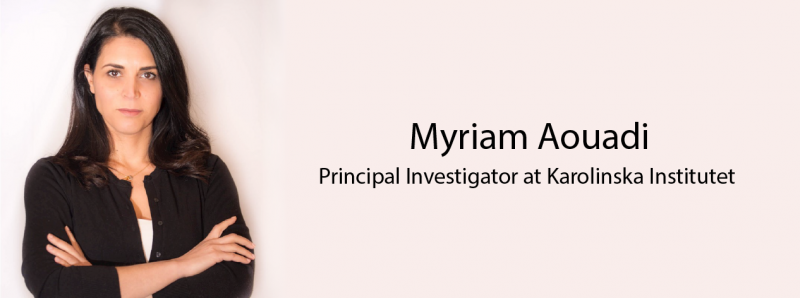
“Resilience, grit and passion: the key for success in academia”
Name: Myriam Aouadi
Did PhD at: Université Nice Sophia Antipolis
Current position: Principal Investigator at Karolinska Institutet
Interviewed by: Mirko E. Minniti
“Never forget the fun part of your work and choose the right mentor to work with.” This is the secret of Myriam Aouadi, who works as Principal Investigator at Karolinska Institutet since 2015. “At every step of my career I was about to choose between academia and industry: I was not seeing lots of opportunities in academia, while I really wanted a stable job and a good salary. But I still like academia better.”
After her MSc in France, Myriam was not convinced at all to continue in academia. Eventually, she opted for a PhD to study adipogenesis, diabetes and inflammation. “I was lucky of having a mentor that transferred his passion for science.” But afterwards she decided to switch to the industry. “I really wanted a stable job and a good salary, and my mentor convinced me that US was the right place for me.” Therefore, after several interviews, she was hired in a small biotech in Boston. Yet after three months she decided to go back to academia. “I had the impression I was not learning enough.”
The co-founder of the biotech company was a Professor at the University of Massachusetts, and he offered her a postdoc position in his research group. Eventually, US turned out to be the right choice. “I’m extremely hard-working and determined. And US is the perfect place to try and test your own ideas.” After 9 fruitful years in Boston during which she reached the position of assistant professor, Myriam realized it was time to go and to be on her own. She was offered to start her own laboratory to study the role of tissue-resident macrophages in metabolic diseases at the Integrated Cardio Metabolic Centre in Stockholm, a partnership between academia (Karolinska Institutet) and industry (AstraZeneca). “The position was great and I couldn’t refuse it.”
The crucial factor of her choosing academia has been the relationship with her mentors. “Mentors are extremely important. Not only work-wise: you need to find someone with whom to click, be inspired and trusted by.” Moreover, “academia means freedom to decide your own research and to choose your own timing.” On the other side, the pressure of publishing is probably what she finds the least fun part of the job. “Publishing should be mainly a way to give access to solid and reproducible data for the scientific community, independently of the impact factor.”
Working in academia requires the right attitude too. “During my PhD, together with the technical skills, I’ve learned how to be positive about difficulties, invest in the future, and enjoy what I am doing. Resilience is a really important skill: If you don’t learn how to persevere during your PhD, it is tough afterwards. The postdoc instead helped me to improve my leadership and communication skills.”
“If you want to continue with science, I’d always suggest to go for a postdoc. Before ending the PhD, go to international conferences and network. Go outside your comfort zone, change country, learn more about yourself and make experiences. Know which area you want to work in and invest on the people you are going to work with. You have to feel inspired by them.”
Photo: Adapted from LinkedIn profile picture, used with subject’s consent.
This career portrait was originally written for the PhD course “Career skills for scientists”, organized every spring by KI Career Service. As explained in the introduction post, all participants in the course interviewed PhD holders with an academic or a non-academic career. Keep an eye on the tag #careerportrait for a selection of these portraits. Get inspired and learn more about your options for your post-PhD career!

0 comments